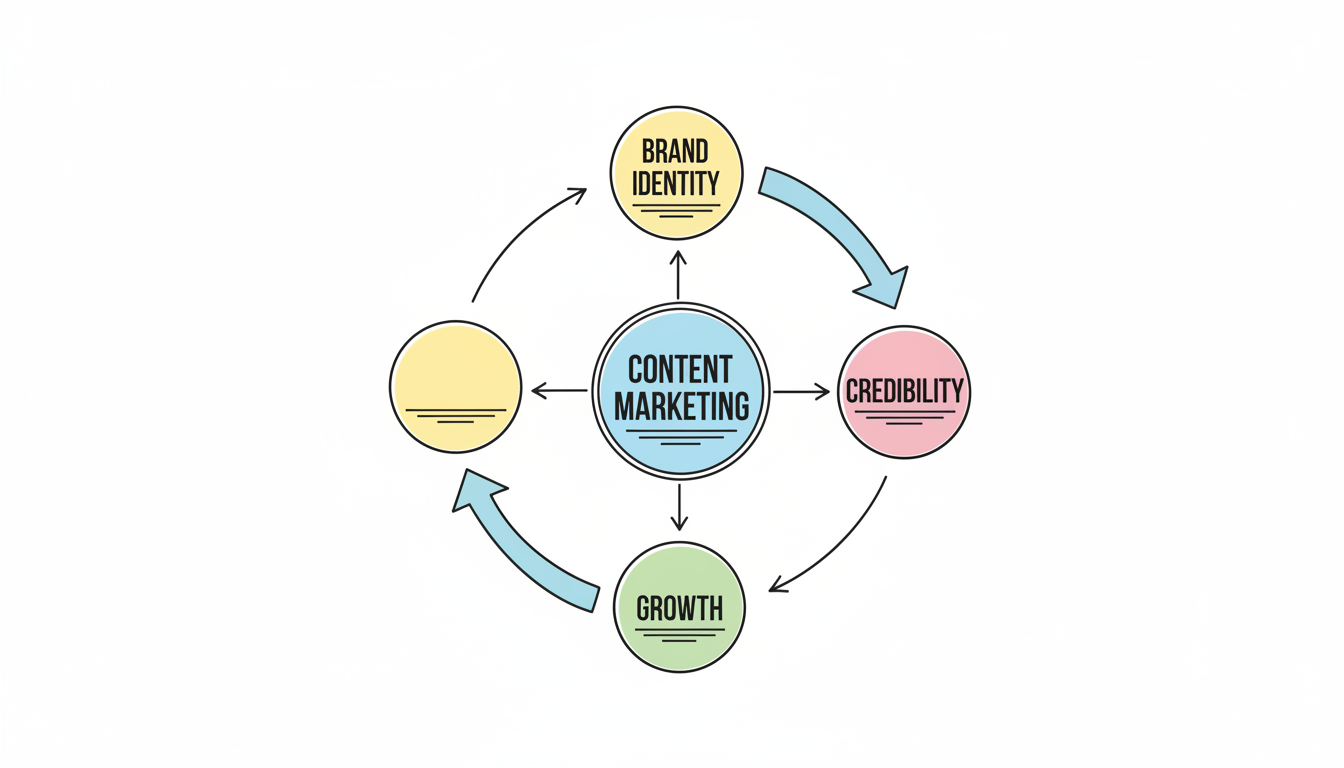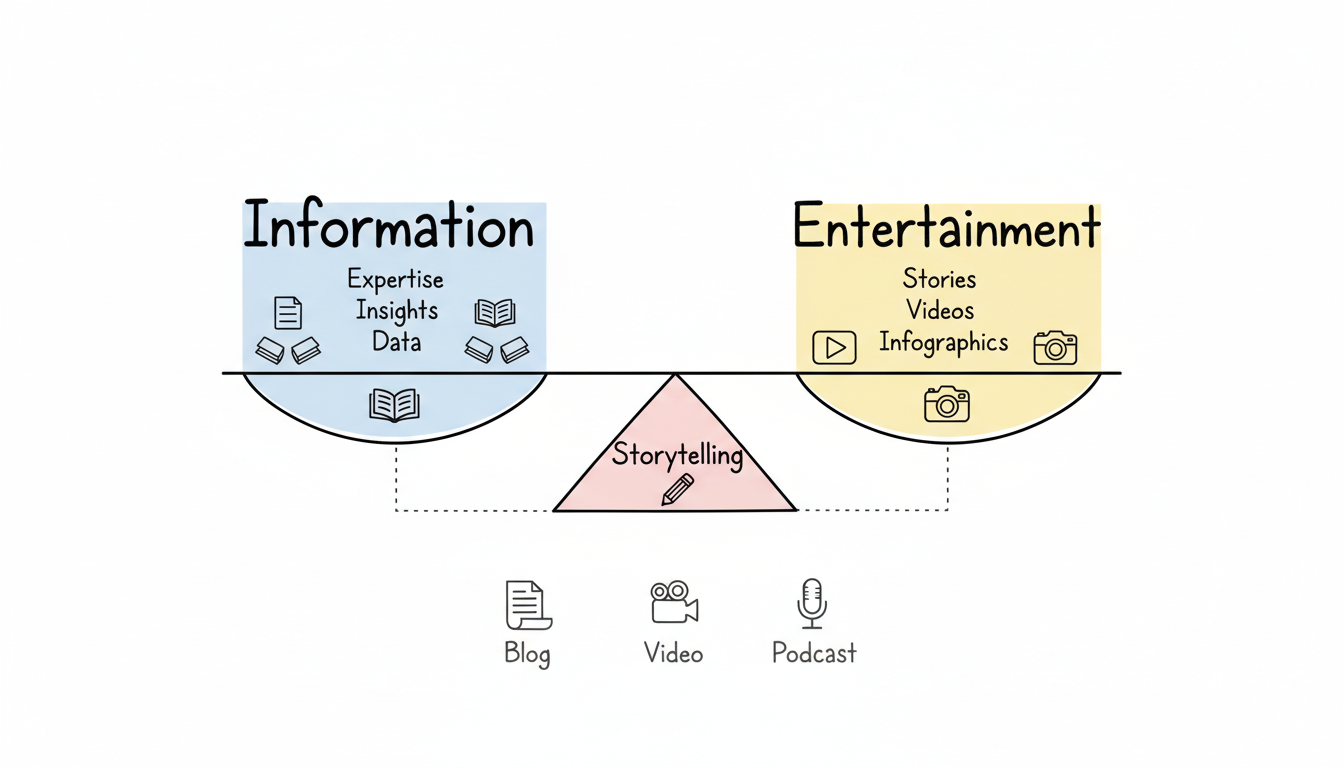In today's digital landscape, content marketing has become a crucial aspect of driving business growth. For startups, it serves as a powerful tool to build brand identity, engage with target audiences, and establish a strong online presence. However, creating compelling content that sets your startup apart from the competition requires careful planning and strategy.
Before delving into the nitty-gritty of content creation, it's essential to grasp the importance of content marketing for startups. Content plays a pivotal role in building brand identity, allowing startups to define their unique voice and connect with their target audience on a deeper level.
A well-crafted content marketing strategy not only attracts potential customers but also helps to establish credibility and authority in the industry. It provides startups with an opportunity to showcase their expertise, share valuable insights, and nurture positive relationships with their audience.
Content marketing is more than just creating blog posts or social media updates. It involves a strategic approach to delivering valuable and relevant content that resonates with the target audience. By understanding the importance of content marketing, startups can leverage this powerful tool to drive growth and achieve their business goals.
Brand identity is the heart and soul of any successful startup. It encompasses the values, personality, and mission that drive your business. Content marketing enables startups to shape and reinforce their brand identity through strategic content creation.
By consistently delivering high-quality and relevant content, startups can establish themselves as industry thought leaders. Engaging storytelling, informative articles, and compelling visuals all contribute to building a strong and recognizable brand identity.
Remember, the content you create should reflect your brand's unique values, solve your audience's pain points, and provide them with valuable information that establishes you as a trusted source.
Building a brand identity is an ongoing process that requires continuous effort and refinement. Through content marketing, startups can effectively communicate their brand's personality, values, and mission to their target audience, fostering a sense of connection and loyalty.
Content marketing goes beyond simply providing information to your audience. It plays a crucial role in driving business growth for startups. When done right, content marketing can attract, engage, and convert potential customers into loyal brand advocates.
By creating relevant and targeted content, startups can attract qualified leads who are genuinely interested in their products or services. Content that addresses their pain points, offers solutions, and provides actionable insights helps to build trust and credibility.
Furthermore, content marketing nurtures leads throughout the buyer's journey, guiding them from awareness to consideration and finally to conversion. The right content at each stage of the journey can significantly impact purchase decisions and drive business growth.
Content marketing also helps startups establish a strong online presence, increasing their visibility and reach. Through various content channels such as blogs, social media, and email newsletters, startups can engage with their target audience, build relationships, and ultimately drive more traffic and conversions.
Moreover, content marketing allows startups to differentiate themselves from competitors. By creating unique and valuable content, startups can position themselves as industry experts and stand out in a crowded marketplace.
In conclusion, content marketing is a powerful tool that startups can leverage to build brand identity, establish credibility, and drive business growth. By understanding the importance of content marketing and implementing a strategic approach, startups can effectively connect with their target audience, nurture relationships, and achieve long-term success.

Now that we've established the importance of content marketing for startups, let's dive into the process of creating a successful content marketing strategy.
Content marketing is a powerful tool that can help startups build brand awareness, drive website traffic, and generate leads. However, to maximize its effectiveness, it's crucial to approach it with a well-defined strategy. In this section, we will explore the key steps involved in developing a successful content marketing strategy.
Before embarking on your content marketing journey, it's crucial to set clear goals and objectives. What do you hope to achieve through your content marketing efforts? Whether it's increasing brand awareness, boosting website traffic, or generating leads, define your goals and align your content strategy accordingly.
Setting specific and measurable goals is essential for tracking your progress and evaluating the success of your content marketing efforts. By establishing measurable goals, you can track your progress, identify areas for improvement, and ensure that your content efforts are driving tangible results for your startup.
For example, if your goal is to increase brand awareness, you may set a target of reaching a certain number of social media followers or gaining a specific amount of media coverage. If your goal is to generate leads, you may aim to increase the number of email subscribers or the conversion rate on your landing pages.
Understanding your target audience is paramount in creating content that resonates with them. Start by building buyer personas that outline the characteristics, interests, and pain points of your target audience segments. This will help you tailor your content to their specific needs and preferences.
When identifying your target audience, consider factors such as demographics, psychographics, and behaviors. Demographics include age, gender, location, and occupation, while psychographics delve into their values, beliefs, and interests. By understanding these aspects, you can create content that speaks directly to their needs and desires.
Identifying your target audience allows you to craft messaging that speaks directly to them, ensuring that your content strikes a chord and fosters a meaningful connection. Remember, relevance is the key to capturing your audience's attention and keeping them engaged.
For instance, if your startup targets tech-savvy millennials who are passionate about sustainability, your content strategy may focus on topics such as eco-friendly products, renewable energy, and sustainable living tips.
By understanding your target audience's pain points, you can address their challenges and provide valuable solutions through your content. This not only establishes your startup as a trusted authority but also builds credibility and fosters long-term relationships with your audience.
Now that you have a solid foundation for your content marketing strategy, let's explore the key elements that make content compelling and memorable.
Compelling content goes beyond just providing information. It is about creating an experience for your audience, one that resonates with them on a deeper level. To achieve this, you need to harness the power of storytelling in your content creation.
Humans have an innate love for stories. We have been telling stories since the beginning of time, passing down knowledge, culture, and traditions through oral and written narratives. Storytelling taps into our emotions, captures our attention, and leaves a lasting impression.
When it comes to content marketing, storytelling allows you to create a personal connection with your audience. By crafting narratives that resonate with their experiences, challenges, and aspirations, you can forge strong and lasting relationships. Your startup becomes relatable and memorable, as your audience sees themselves reflected in your stories.
But how do you create compelling stories? Start by understanding your target audience. What are their pain points? What are their dreams and aspirations? Once you have a clear understanding of who they are, you can craft narratives that speak directly to them. Use vivid descriptions, relatable characters, and compelling plotlines to captivate their attention and inspire action.
Compelling content strikes the perfect balance between providing valuable information and entertaining your audience. While educational content showcases your industry expertise, injecting elements of entertainment can keep your audience engaged and coming back for more.
Think about it - when was the last time you willingly sat through a boring lecture? Chances are, it wasn't a pleasant experience. The same goes for content. If your audience finds your content dull and uninteresting, they are unlikely to engage with it or remember it.
So, how can you make your content both informative and entertaining? One way is to utilize a variety of content formats. Videos, infographics, and podcasts can add a visual and auditory element to your content, making it more engaging and appealing. These formats allow you to present information in a more dynamic and interactive way, keeping your audience hooked.
Another way to balance information and entertainment is through storytelling, as mentioned earlier. By incorporating storytelling techniques into your educational content, you can make it more relatable and engaging. Use real-life examples, case studies, and anecdotes to illustrate your points and bring your content to life.
Remember, the goal is to educate and entertain your audience simultaneously. By striking the right balance between these two elements, you can create content that not only informs but also captivates, leaving a lasting impression on your audience.

Creating amazing content is only half the battle. To ensure that your startup's content reaches the right audience, it's essential to implement SEO strategies.
Do thorough keyword research to identify the phrases and terms your target audience is searching for. Incorporate these keywords strategically within your content to optimize it for search engines.
However, avoid keyword stuffing, as it can detract from the readability and value of your content. Instead, focus on creating high-quality content that naturally incorporates relevant keywords.
Building quality backlinks is crucial for improving your startup's search engine rankings. Seek opportunities to guest post on reputable industry websites, collaborate with influencers, or participate in online communities.
When other authoritative websites link back to your content, search engines view your content as valuable and trustworthy, boosting your visibility and organic search rankings.
Measuring the success of your content marketing efforts is essential to understand what works and what needs improvement.
Identify key performance indicators (KPIs) that align with your content marketing goals. These could include metrics such as website traffic, social media engagement, lead generation, or conversions.
Regularly monitor and analyze these KPIs to gain insights into the effectiveness of your content marketing strategy. Use these insights to make data-driven decisions and optimize your future content creation efforts.
By analyzing your content performance data, you can identify trends, patterns, and areas for improvement. Take a proactive approach by making necessary adjustments to your content marketing strategy based on this data.
Experiment with different content formats, topics, and distribution channels to find what resonates best with your target audience. Continuously iterate and refine your content strategy to drive improved results.
In conclusion, content marketing is a powerful tool for startups to build brand identity, engage with their target audience, and drive business growth. By understanding the importance of content marketing, defining clear goals, creating compelling content, implementing SEO strategies, and measuring success, startups can set themselves up for content marketing success.
By submitting this form, you agree to our Privacy Policy and Terms & Conditions.